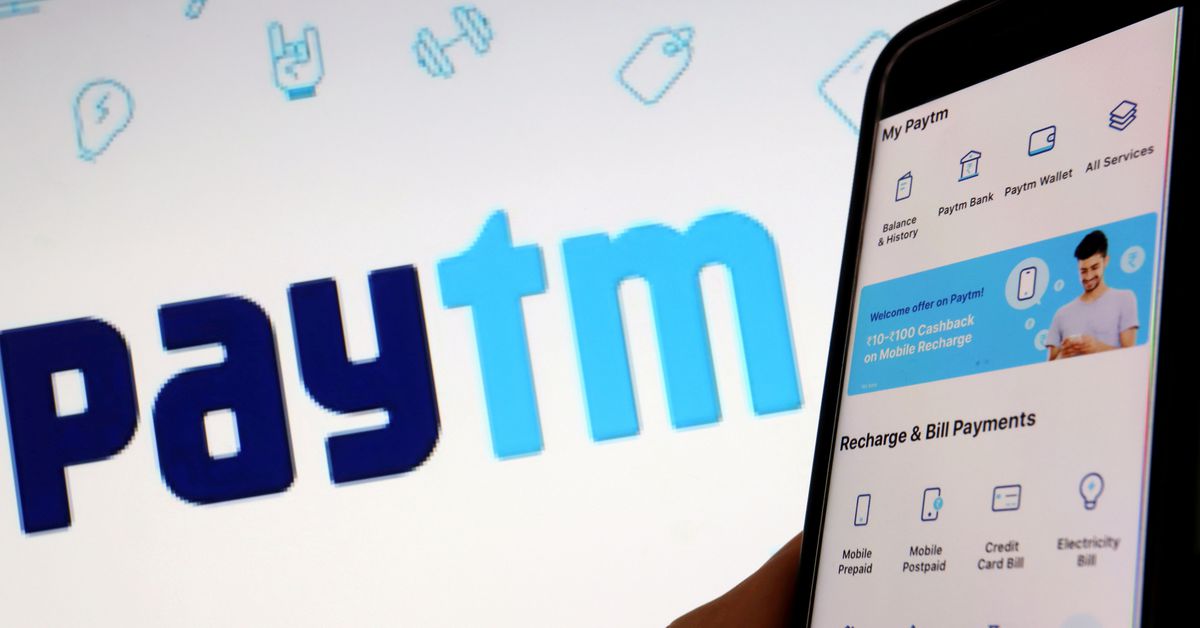The interface of Indian payments app Paytm is seen in front of its logo displayed in this illustration picture taken July 7, 2021. REUTERS/Florence Lo/Illustration
BENGALURU, Nov 10 (Reuters) – Paytm’s $2.5 billion initial public offering (IPO), India’s largest, was oversubscribed at the close of bidding on Wednesday, although investors showed less enthusiasm than for some other tech firms that have ridden the country’s IPO boom.
The company, which had already raised $1.1 billion from anchor investors, received $2.64 billion worth of bids for the remaining shares on offer, or 1.89 times, according to stock exchange data.
Institutional investors bid for 2.79 times the shares reserved for them, while retail investors bid for 1.66 times.
Some analysts said the company, centered around payments but marketed as an all-in-one app, may have struggled to sell its complex model to investors as well as its path to profitability.
Loss-making Paytm, formally called One97 Communications, offers a range of services from banking, shopping, movie and travel ticketing to gaming.
“In every Paytm business there is already an incumbent player and there is no clear path to profitability. When you combine that with the valuation, it just doesn’t sit right,” said a fund manager with an investment firm that has stakes in several Indian startups, but decided against investing in Paytm.
Other analysts, however, said a subscription level of 1.89 times was on a par with other major global issues and showed Indian investors had confidence in digital businesses.
Paytm increased the size of its offering last month and priced it at 2,080-2,150 rupees per share, targeting a $20 billion valuation which some retail investors saw as expensive.
“I’d have liked to invest in Paytm if the price was a little lower. At this price Paytm is highly overvalued for a company that’s not going to turn a profit any time soon,” said Pratik Chandra, a 30-year old chartered accountant from Jamnagar, Gujarat.
Marquee investors trimmed their stakes in the IPO. Ant Group (688688.SS), which had a 28% holding in Paytm, is selling shares worth 47.04 billion rupees and will be left with a 23% stake. SoftBank’s (9984.T) Vision Fund is cutting its stake by 2.5 percentage points to 16% with a 16.89 billion rupee share sale.
Paytm’s IPO will be the largest Asia Pacific fintech IPO ever and is also the second largest fintech IPO of 2021 globally, said Elevation Capital, which will own 15% of shares in Paytm after the IPO.
“We hope to continue to strive and drive financial inclusion for the underserved and unserved population of the country,” a Paytm spokesperson said, adding the company was overwhelmed by the response to its IPO.
WEAK RESPONSE VS ZOMATO, NYKAA
By comparison, food delivery start-up Zomato’s (ZOMT.NS) IPO was more than 38 times oversubscribed earlier this year and its shares are up around 79% from the offer price, while e-commerce beauty platform FSN E-Commerce Ventures (Nykaa) (FSNE.NS) saw demand for 82 times the number of shares on offer.
Nykaa’s shares rocketed 96% from the offer price on their market debut on Wednesday. read more
Zomato and Nykaa are both much smaller companies than Paytm, however.
India has seen an IPO frenzy this year with increased retail participation as investors rode a wave of liquidity provided by central banks that has taken domestic markets to record highs.
Dozens of companies have tapped the capital market and everyday brands including Oyo, Dehlivery and PolicyBazaar have sought stock exchange listings.
Paytm last week said it had allocated shares worth 82.35 billion rupees to more than 100 institutional investors, including the government of Singapore, BlackRock Global Funds, Canada Pension Plan Investment Board and Abu Dhabi Investment Authority. read more
($1 = 74.3325 Indian rupees)
Reporting by Chandini Monnappa, Vishwadha Chander and Chris Thomas in Bengaluru, Abhirup Roy in Mumbai, Sankalp Phartiyal in New Delhi
Editing by Shailesh Kuber and Mark Potter
Our Standards: The Thomson Reuters Trust Principles.
